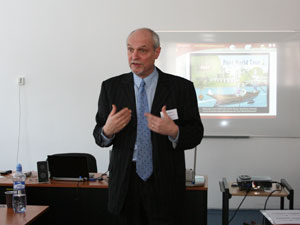About Gary Anderson

Gary Anderson was Pedagogical Director of the language program of the former American Center in Paris, and President-elect of TESOL France when he joined Cambridge ELT as International Teacher Trainer based in Paris.
He has given talks in over 50 countries on five continents, including at TESOL International and IATEFL UK. In this blog, Gary writes about the events he attends and shares some of the ideas and tips that he gives in his talks.
Blog posts
- On the Road with Gary Anderson in…Slovakia
- On the Road with Gary Anderson in…Italy
- On the Road with Gary Anderson in…Lithuania
- On the Road with Gary Anderson in…Romania, Greece and the Czech Republic
- On the Road with Gary Anderson in …Kazakhstan
- On the Road with Gary Anderson in …Switzerland
- On the Road with Gary Anderson in …Serbia
Gary's upcoming travels
- Romania: Cambridge Day, Bucharest; February 27
- Poland: Workshops in Katowice, Krakow, Szczecin, Gdansk; March 10–17
- Bosnia: Workshops in Mostar and Bijeljina; March 25–26
- Croatia: Workshops in Slavonski Brod and Osijek; March 29–30
- UK: IATEFL, Harrogate; April 7–11
- Russia: Workshops in Moscow, Nizhni, Saratov; April 11–15
- Belgium: Cambridge Day, Brussels; April 24
- Netherlands: English for Schools Day, Utrecht; April 28
Sign up for RSS feed
Read Gary's latest blog post as soon as it appears!
Blogs by Cambridge authors
Follow your favourite Cambridge authors here:
- DCBlog, David Crystal
- Bob Dignen's blog on Professional English Online
- That'SLife, Gavin Dudeney
- Andy Hockley's blog
- The Spelling blog, Johanna Stirling
On the Road with Gary in …Slovakia
Deductive/Inductive…Seductive/Productive Grammar
Along with about a hundred other teachers, trainers, professors and publishers I attended a very nice one-day conference in Slovakia at the end of last month organised by International House Bratislava and held in the Metodicko-Pedagogické Centrum Regionàlne, i.e. the regional methodological-pedagogical centre (sorry, bet you can translate that for yourself).
I gave three talks including the opening plenary on 'Profiling English Profile' (but Iíve already talked about the English Profile programme in a preceding blog so won't write about that again. What I'd like to write about this time was the subject of one of my two other workshops: 'Interactive Teaching and Learning: Grammar for the Body and the Mind'

The 'body' part of interactive teaching/learning grammar had to do with the self-study CD-ROMs accompanying the Grammar in Use series as well as the forthcoming Grammar in Use Classware for teachers – and students! – to use in the classroom with an IWB (interactive whiteboard, right) or with a normal whiteboard and a Mimio® e-beam. Plus a couple of ideas for getting especially kinaesthetic learners to get their bodies into learning grammar: Have students stand up and put themselves in a line in order of, say, who's taller/tallest for comparative/superlative adjectives, or who got up at what time or ate the biggest breakfast for simple past, etc. Have students cut up the parts of sentences and with separate auxiliary-verbs cards rearrange and turn them into questions.
The 'mind' part had to do with the question: Do students learn grammar better deductively or inductively? Before we try to answer that question, let's review what is meant by deductive and inductive learning/teaching. Deductive means 'giving' the rule to students and then having them practice with examples; sort of top down. Inductive on the other hand means providing examples and then 'guiding' them to come to the rule themselves; much more bottom up. (That 'giving/guiding' distinction, by the way, comes from Martin Parrott's Tasks for Language Teachers.)
It's sort of like Sherlock Holmes and Dr Watson: Detective Holmes (like my favourite detective Colombo) was inductive – 'noticing' (another buzz word in ELT that used to be called 'language awareness') clues, making hypotheses and then coming to a conclusion – which always surprised the much more literal, deductive Watson who would think that, say, because the criminal wore high heels and smoked cigarettes, it must be that woman. Holmes au contraire would measure the size of the shoe and the depth of the footprint, look at the brand of cigarette, and perhaps even sniff around for any lingering perfume before coming to his rule – er, conclusion.
So what about grammar? Should students be given the rule and then practice, or be guided with similar examples (and corresponding 'concept questions' to check comprehension) – to the rule?
Well, my (bad) joke is that grammar should be taught and learnt…seductively! The teacher needs to seduce students – in a manner of speaking – into learning grammar (or other language skills) in their own way. If you don't like 'seductive', let's say 'productive' – whatever is best for the individual learner. In other words, both deductively and inductively – which is what teachers, as at the IH Bratislava conference, usually say to me when I ask the question 'Do students learn grammar better deductively or inductively?'. Because of course it depends on lots of things: the type of learner or class and your teaching situation. But also the grammar rule concerned. If it's quite similar or quite different to their native language, you might want to 'give' them the rule – or 'guide' them to discover. 'Guided discovery' is now how most course books treat grammar – with of course built-in concept questions. And also with Grammar Reference sections in the back for the Dr Watsons among your learners.
I remember a report in the ELGazette back in 1999 that summarized a Teaching of Grammar colloquium held at St Mary's Strawberry Hill (sounds like a wonderful place to attend a grammar symposium!) in the UK: 'Advocated guided discovery and consciousness-raising activities in which grammar points are made more salient for learners.' SLA (Second Language Acquisition, but I know you know that) Professor Rod Ellis was quoted: 'We can at least be confident that discovery tasks are as good as explanations.' In other words, both! Deductive and inductive – or seductive/productive.
What do you think? Do students learn grammar better deductively or inductively? What's more seductive/productive for your learners? Looking forward to reading your ideas…
Gary Anderson, Cambridge ELT International Teacher Trainer


